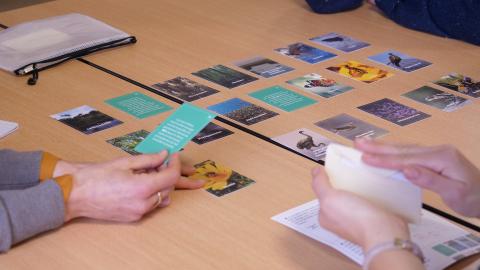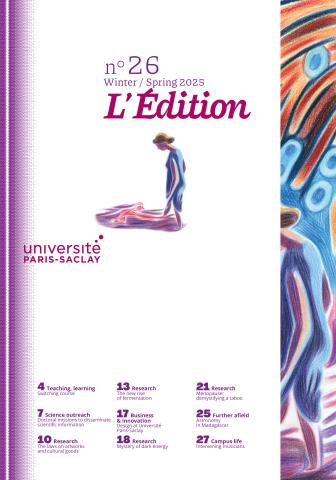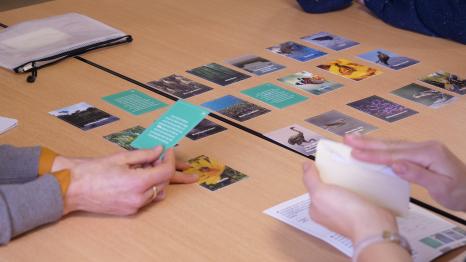
Demain autrement: a one-day course on the challenges of sustainable development
This article was originally published in L'Édition n°26.
Université Paris-Saclay has developed a unique course, "Demain autrement" (A different tomorrow), intended to familiarise all staff members with the challenges of sustainable development, climate change and biodiversity loss. Suitable for all audiences, the course is designed as a shared adventure combining teaching materials, scientific games and discussions with the PhD candidates responsible for presenting it.
Tunisia in 2023, Germany in 2022, Japan in 2021... Each of these disaster scenarios is laid out on the table by the participants. Their objective is simple: complete the sequence of missing squares using the cards available to them. What climatic factor affected Germany in 2022? What impact did this have? Losses in the agricultural and industrial sectors, disruption to transport systems... Discussions between the players become animated as they try to decide between the various cards on offer. "The aim of this activity is to present tangible examples of the manifestations of climate change and their impact on our societies," explains Alexandra, a PhD candidate at Université Paris-Saclay responsible for presenting that day's activities. This activity is just the first in a one-day course bringing together around a dozen learners.
"Demain autrement" (A different tomorrow) is the name of the innovative programme launched by Université Paris-Saclay in November 2024. It aims to raise awareness of sustainable development issues among the some 16,000 staff members at the university. "The idea is to introduce them to the conclusions of scientific research into climate change and biodiversity loss, so that they can understand why it is important to talk about sustainable development," explains Émilie Roger, director of the university's Institute of Staff Education and Skills Observatory. This course is part of a wider initiative, the SPRINGBOARD project, developed by Université Paris-Saclay as part of France 2030.
"Université Paris-Saclay has been committed to climate and biodiversity issues and the ecological transition more broadly speaking for many years now, as part of its missions in research, education, expertise and innovation," highlights Benoît Gabrielle, Vice-President for Sustainable Development and Social Responsibility at Université Paris-Saclay. "The ‘Demain autrement’ course is unique in this respect, as it educates university staff in sustainable development concepts and issues, giving them the keys they need to understand and act in the face of today's challenges."
A course designed to be accessible to all
This course is the result of a long term project started in 2023, which brought together the staff of the Institute of Staff Education and Skills Observatory, La Diagonale Paris-Saclay - the Université Paris-Saclay's Arts, culture, sciences andsociety department - and the university's Sustainable Development mission, underthe scientific leadership of Sophie Szopa, director of research at the Laboratory forClimate and Environmental Sciences (LSCE- Univ. Paris-Saclay/CNRS/CEA/UVSQ). "We seriously debated the format of this course. Given the subject matter, we didn't want to design a top-down lecture that would be too heavy-handed," recalls Émilie Roger. "The other difficulty was that this course had to be accessible to everyone."
That’s why "Demain autrement" has become a group, in-person adventure, combining education materials, scientific games and time for discussions. Each session brings together around twenty learners, divided into small groups to complete the activities. Throughout the day, the programme reviews all the keypoints relating to climate change, biodiversity loss and the possible levers for action in the face of these upheavals. Written by Aïcha Ben Dhia, a trainer specialising in environmental transition issues, the education content is based on the IPCC (Intergovernmental Panel on Climate Change) and IPBES (Intergovernmental Platform on Biodiversity and Ecosystem Services) reports, which compile the work of thousands of scientists worldwide on climate and biodiversity issues.
An agency specialising in narrative strategy, Étonnamment, si., also stepped in to make the content more lively and entertaining by designing the staging and the different activities. In addition to the activity described above, another activity, for example, invites each team to imagine a scenario taking place in 2060, in line with imposed criteria. Through the game, "we want learners to acquire the necessary knowledge themselves, so that they're inspired to take action and become involved in the field of sustainable development," says Émilie Roger.
The sessions are presented by PhD candidates from Université Paris-Saclay, who have previous experience with the subject as part of a doctoral mission. "We see it as a virtuous circle," explains Émilie Roger. With this course, "we're giving them the opportunity to develop professional teaching and outreach skills. It also allows the university's communities to mix even more."
Accelerating the pace of courses in 2025
Two months after its launch, someone hundred university staff have already taken the course. "The aim is to pick up the pace in 2025," says Céline Dupont, coordinator of the "Demain autrement" project at the Institute of Staff Education and Skills Observatory. "We'll be offering two to three courses a week, then ramping up over the next few months," to achieve the goal of educating the entire university staff community within two years.
The course has already been held onseveral campuses, such as Orsay, Kremlin-Bicêtre, Moulon plateau and AgroParisTech, but will be available in new locations, including Université d'Évry and Cachan Technical Institute (IUT). After each session, learners receive a booklet containing all the key elements covered during the course, plus additional resources for further study. To register, use the Geforp platform or the online form.
Learn more:

This article was originally published in L'Édition n°26.
Find out more about the journal in digital version here.
For more articles and topics, subscribe to L'Édition and receive future issues:
